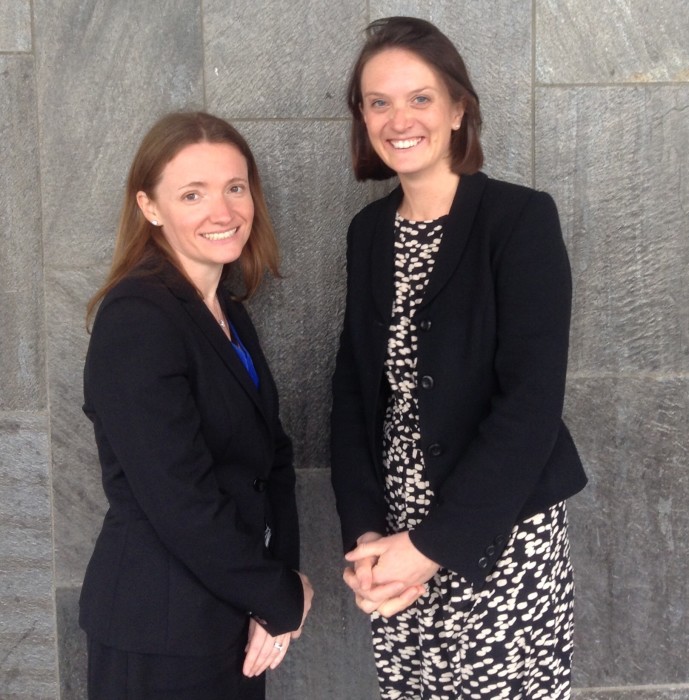26th February 2016 Geneva, Switzerland
Not your typical intern


I am not your typical intern. I am about to turn 35, I have 2 children aged 5 and 3, and a previous career as a Barrister. I traded in late night briefs, daily court advocacy and negotiations, and challenging clients for the trials and tribulations of child rearing and home making.
Eighteen months ago an opportunity came up with my husband’s job and we left suburban London for Geneva. Having settled both children in school and improved my ‘franglais’, I started to look for work. The UK Mission was looking for interns, and there was work that would combine my legal skills with new political and human rights work; it was an ideal restart for my career.
So aside from learning to defend myself from flying raspberry smoothies at 8.10am (deflect it back over your child: it’s easier to hose them down from head to toe and change them in 5 minutes flat) what have I been doing and what have I taken from the experience so far?
Day 2 and I was straight into the September Human Rights Council, the first thing I had to get used to were the copious acronyms. I was handed two thematic resolutions to lead on and with much advice and support from the experienced UK team I started to navigate the informal negotiations, side events, plenary sessions and corridor conversations. Negotiating and public speaking skills from the Bar stood me in good stead and it was incredibly satisfying to deliver arguments in front of colleagues from other countries. The politics and dynamics of multi-lateral diplomacy were fascinating, and after my time out, invigorating.
My supervisor the Legal Adviser and I then ploughed forward towards the quadrennial Red Cross and Red Crescent conference in December, looking at a range of issues across International Humanitarian Law and humanitarian responses on the ground. It had an ambitious agenda of 9 Resolutions, including controversial ones on legal compliance and on Sexual and Gender based violence. We hosted a delegation of 18 from London; organised agendas, briefings, dinners, and a side event on sexual and gender based violence in conflict and other emergencies.The event was moderated by Baroness Anelay and attended by experts in the field and Ambassadors. It related closely to the pledges we drafted with the PSVI team; all aiming to further the government’s agenda to better protect women and girls in conflict and promote gender equality, particularly in relation to Peace and Security.
Participating in the UN mechanisms that seek to drive up standards of human rights towards equality and non-discrimination, I have started to reflect on ‘the gender issue’ as a mum back in work.
We may have the world’s first gender equal Cabinet (Canada), and the first feminist government (Sweden), but there is a long way to go towards gender equality, or even women at the table in 30% of leadership or management positions. ‘Geneva Gender Champions’ are seeking to drive this forward; a network of senior leaders such as Ambassador Julian Braithwaite, who are working to advance gender equality in the executive management of their institutions and their programmatic work through concrete and measurable commitments. A range of ideas include gender targets for staffing, delegation composition and procurement; work-life balance and flexible working for all, mentorship for women and unconscious bias training for all. Hopefully with some political capital invested, there will be scope for creativity and innovation to address one of the greatest challenges of modern society.
The family courts in the UK, as in other countries, have for a long time recognised the equal role of the career maker/ home maker in divorce proceedings. But in very few countries is this recognised by society at large. Not only is there limited financial support for pre-schoolers, there is limited value placed on the role of the parent who stays at home to look after them. Many families with dual careers find that something has to give and it is often women who return part-time or not at all. Until we address this, there is always going to be a gender gap. A start would be to have equal legal entitlement to parental leave, and society accepting that men can and should take it, even if they work in careers where they are on track to be leaders or managers, or in the ‘tough professions’. You might just find more female leaders and managers, and ‘tough professions’ being more reasonable for all.
This is a great piece Fleur. Its Interesting that you were willing – and thus presumably financially and logistically able to take an internship after achieving such high qualifications. We should all remember to consider that having enjoyed time with our children, which we are still biologically programmed to do, that we don’t necessarily have to return to the same role, level of seniority, pay and hours that we previously achieved.
I believe we do need equal legal entitlements to enable our choices but the tougher challenge is to influence attitude and behaviour within our societies.